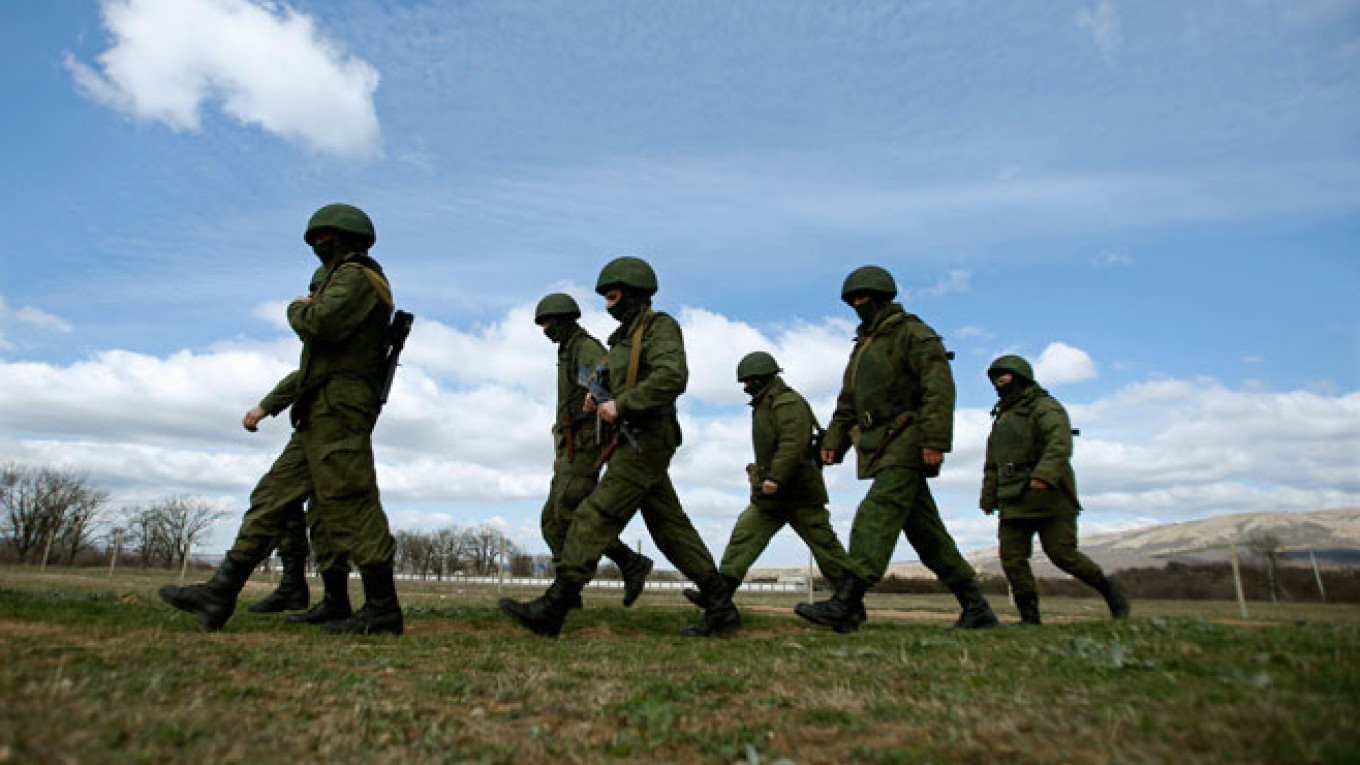KIEV — Some 40,000 volunteers have come forward to join a proposed new National Guard, Ukraine's new pro-Western authorities say, a tentative first step toward overhauling a military outgunned and outmanned by Russia.
With Ukraine's Crimea peninsula firmly in the grip of Russian forces, parliament on Thursday considered a bill to create a 33,000-strong force.
Initiated by Acting President Oleksander Turchynov, who this week outlined the sorry state of the Armed Forces, the bill tasks the guard with maintaining public order, protecting sites like nuclear power plants and "upholding the constitutional order and restoring the activity of state bodies."
Turchynov became interim head of state after three months of mass protests culminated in the overthrow of Russian-backed President Viktor Yanukovych, angering Moscow and triggering the worst East-West crisis since the Cold War.
"As of today, Ukraine's military enlistment offices have registered 40,000 volunteers," said Andrei Parubiy, secretary of the National Security and Defense Council, according to an official statement.
"Already tomorrow, the self-defense forces and activists of the Maidan will start their training."
Parubiy was referring to Kiev's Independence Square, focus of the protests since late November. He earned public admiration as the "chief of staff," responsible for maintaining order on the square during gatherings of up to a million demonstrators.
Turchynov told parliament Tuesday that mismanagement under the ousted Yanukovych meant the armed forces had to be rebuilt "effectively from scratch."
The acting defense minister said Ukraine had only 6,000 combat-ready infantry compared to more than 200,000 Russian troops on its eastern borders.
Among the dozens of men in combat gear still camped out on Independence Square and vowing to remain until they are satisfied with the new government, there was both interest and skepticism toward the new force.
Kolya Bondar, who leads a group calling itself the 4th Cossack Hundred, wanted more details of the government's plan. He suggested that, like citizen armies in Switzerland or Israel, civilians should be encouraged to keep rifles at home.
"I have heard of it," a man called Mykola said uncertainly. "Sure. We are ready to fight Russia. We will push them all the way to Siberia."
The creation of a National Guard is one of several measures under consideration to bolster defense capabilities. Exercises involving tanks, artillery and infantry get underway this week in western and northern Ukraine.
An earlier post-Soviet attempt to create a force patterned on the U.S. National Guard collapsed in the 1990s, with servicemen transferred to other military bodies.
And not all analysts believe the new force will prove useful.
"At the moment, the main task is to strengthen the Armed Forces and marshal resources to enlarge them. This is not the most appropriate time to be creating a National Guard," said military analyst Sergei Zgurets.
"It would be more useful to talk about a National Guard later when we start proceeding with real military reforms. How is this new institution to be armed, what will be its tasks? While we engage in discussions, we are losing lots of time."
Back on the square, a man wearing a badge of the Maidan "self-defense force" said he had served in the first short-lived National Guard as a warrant officer in the 1990s, when Ukraine's authorities cut short earlier attempts in Crimea to promote pro-Russian separatism.
"It would be very hard for us to fight Russia. We do not have the weapons," he said. "But they are fighting for money and we are fighting for our souls, our families. So there could be some kind of partisan warfare."
A Message from The Moscow Times:
Dear readers,
We are facing unprecedented challenges. Russia's Prosecutor General's Office has designated The Moscow Times as an "undesirable" organization, criminalizing our work and putting our staff at risk of prosecution. This follows our earlier unjust labeling as a "foreign agent."
These actions are direct attempts to silence independent journalism in Russia. The authorities claim our work "discredits the decisions of the Russian leadership." We see things differently: we strive to provide accurate, unbiased reporting on Russia.
We, the journalists of The Moscow Times, refuse to be silenced. But to continue our work, we need your help.
Your support, no matter how small, makes a world of difference. If you can, please support us monthly starting from just $2. It's quick to set up, and every contribution makes a significant impact.
By supporting The Moscow Times, you're defending open, independent journalism in the face of repression. Thank you for standing with us.
Remind me later.






